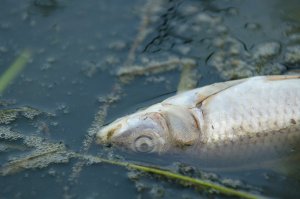
Here's a very Canuck fantasy for tax season. Imagine you had a gold mine of your very own. Let's say you've got a little lakefront place and one day last summer while skipping stones with the kids you discovered gold (substitute copper, nickel or marketable metal of your choice). Since you wisely acquired mineral rights, you can start digging this year. The trouble is, for every hundredweight of ore you haul up and process, 95 to 99.9 per cent of it will become a soggy, leaky, acutely toxic pile of waste. Where should you put this?
The last thing you'd do to solve this uniquely Canadian problem is to dump the toxic mess into your pretty little lake -- where your kids swim, where the pickerel or trout are plentiful.
Yet that is precisely the new trend in Canadian mining. Exploiting a loophole in the Fisheries Act, mining companies -- with the full blessing of the federal government -- are permanently destroying pristine fish-bearing lakes by turning them into waste dumps.
With the arrival of Canada Water Week, we in this lucky land must remind ourselves that we are stewards of the greatest lakefront property in the world. Collectively, we citizens of this freshwater country also happen to be mineral-rich. Sadly, our old-school government is incapable of exploiting the latter wealth without destroying the former.
A reg gone rogue
Under the little-known Schedule 2 of The Metal Mining Effluent Regulations, healthy wild lakes are being reclassified as "tailings impoundment areas." The effluent regulations were created to protect Canadian waters, not destroy them. When the Liberal government revised the regulations in 2002, Schedule 2 was a last-minute grandfather clause to legitimize five already-polluted lakes.
Since 2006, the Harper government has used Schedule 2 to sanction the destruction of no less than eight healthy, wild lakes or water bodies, and grandfathered another six already-polluted ones. Mining companies stand to gain enormous cost savings via Schedule 2 "exceptions." No need to build expensive tailings containments from scratch if the government will let you just dump your industrial waste in a nearby lake and be done with it.
Bizarrely, the mining industry would have Canadians believe that purposely destroying pure Canadian lakes is somehow environmentally responsible. Natural lakes make "safer" containments, they argue, than any structure they could build. This cynical doublespeak merely clouds the ugly truth -- that Schedule 2 is a quick and dirty means to profit.
Prosperity Mine's gambit
It all sounds implausible. But the recent decision to give Taseko Mines Ltd. a second environmental review for its already-discredited Prosperity Mine proposal in central British Columbia shows how far we have moved toward making lake-killing standard practice for Canadian mining in the 21st century.
In 2010, the Canadian Environmental Assessment Agency rejected Taseko's proposal to build a $1 billion gold-copper mine in the South Chilcotin. Under Schedule 2 fine print, beautiful Fish Lake would have been drained and destroyed forever. We owe a debt of gratitude to the Tsilhqot'in National Government whose vehement protests no doubt swayed the review panel. Now Taseko is back with an almost identical proposal that would spare Fish Lake but still destroy Little Fish Lake, a smaller water body upstream.
Meanwhile, across the country, the coalition called the Sandy Pond Alliance is awaiting their day in federal court, hoping to have Schedule 2 ruled in contravention of the Fisheries Act. Even if they win, it might be too late to save trout-rich Sandy Pond itself from becoming a nickel tailings pit for Vale Inco.
Emerging trend
The number of water bodies threatened by Schedule 2 is not easy to get. Neither Environment Canada nor Fisheries and Oceans publishes a simple list. Thanks to the vigilance of folks at NGOs who painstakingly track mining sector environmental reviews, it is known that 20 water bodies are already destroyed or in-process under Schedule 2.
What began as handful of one-time exceptions is an emerging business trend. Alexander MacDonald of Nature Canada estimates that about one-in-six of Canada's metal mines have already sought protection under Schedule 2. Taking a stand against this dangerous precedent alongside many environmental and social justice groups, Nature Canada has launched a campaign called Stop Wasting Our Lakes.
Mining companies see plainly that government environmental stewardship in Canada is being torn asunder by the Harper government. They know that the demoralized rank and file at Environment Canada and the Department of Fisheries labour under gag orders. They are emboldened by our departure from Kyoto. They see the time is ripe for sophistry, a chance to turn back the clock on our hard-won environmental law.
We citizens cannot allow our government to re-label pieces of the legally protected biosphere simply to have them destroyed for profit. It threatens more than just lakes, but the whole human-nature sphere. Schedule 2 belongs in the nineteenth-century. We might just as well re-start the bison slaughter. In 2012, Canadians will no longer accept permanent environmental damage as the cost of transient corporate profit.
[Tags: Environment, Labour + Industry.] ![]()
Read more: Labour + Industry, Environment














Tyee Commenting Guidelines
Comments that violate guidelines risk being deleted, and violations may result in a temporary or permanent user ban. Maintain the spirit of good conversation to stay in the discussion.
*Please note The Tyee is not a forum for spreading misinformation about COVID-19, denying its existence or minimizing its risk to public health.
Do:
Do not: